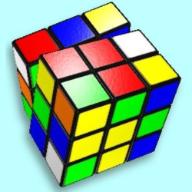Determine if each infinite geometric series is convergent or divergent?
2020-11-02 10:14 pm
MAth question

回答 (2)
2020-11-02 11:49 pm
First figure out the common ratio by taking any term and dividing it by the prior term.
If that ratio (r) is less than 1, then the series converges to a finite sum. (Technically you want to say |r| < 1 but all your ratios are positive.)
Let's check a few:
0.03 / 0.3 = 0.1 < 1 ← converges
0.05 / 0.25 = 0.2 < 1 ← converges
1.15 / 0.23 = 5 ≥ 1 ← diverges
...
Incidentally, if |r| < 1, then the formula for the infinite sum is:
S = a/(1 - r)
a : first term
r : common ratio
For example, the first series converges to:
S = 0.3 / (1 - 0.1)
S = 0.3 / 0.9
S = 3/9
S = 1/3
And it makes sense if you think of it as a decimal:
S = 0.3 + 0.03 + 0.003 + ...
S = 0.33333...
S = 1/3
If that ratio (r) is less than 1, then the series converges to a finite sum. (Technically you want to say |r| < 1 but all your ratios are positive.)
Let's check a few:
0.03 / 0.3 = 0.1 < 1 ← converges
0.05 / 0.25 = 0.2 < 1 ← converges
1.15 / 0.23 = 5 ≥ 1 ← diverges
...
Incidentally, if |r| < 1, then the formula for the infinite sum is:
S = a/(1 - r)
a : first term
r : common ratio
For example, the first series converges to:
S = 0.3 / (1 - 0.1)
S = 0.3 / 0.9
S = 3/9
S = 1/3
And it makes sense if you think of it as a decimal:
S = 0.3 + 0.03 + 0.003 + ...
S = 0.33333...
S = 1/3
2020-11-02 11:01 pm
I believe that if the common ratio is:
if 0 < |r| < 1 then it's divergent
if |r| > 1 then it's convergent
So divide the second term by the first to get the common ratio:
0.03 / 0.3 = 0.1 (divergent)
0.05 / 0.25 = 0.2 (divergent)
1.15 / 0.23 = 5 (convergent)
etc.
if 0 < |r| < 1 then it's divergent
if |r| > 1 then it's convergent
So divide the second term by the first to get the common ratio:
0.03 / 0.3 = 0.1 (divergent)
0.05 / 0.25 = 0.2 (divergent)
1.15 / 0.23 = 5 (convergent)
etc.
收錄日期: 2021-05-01 22:15:40
原文連結 [永久失效]:
https://hk.answers.yahoo.com/question/index?qid=20201102141458AAQ66qf


